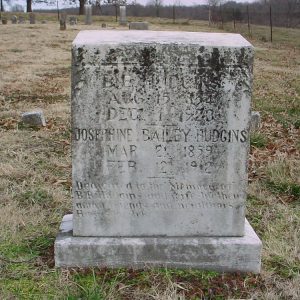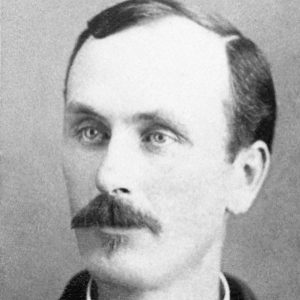calsfoundation@cals.org
Brice Benjamin Hudgins (1854–1923)
Brice Benjamin (B. B.) Hudgins served three terms in the Arkansas House of Representatives, acting as Speaker of the House during his last term. He was elected the circuit court judge for the Fourteenth Judicial Circuit three times, was a prominent attorney in Harrison (Boone County) during the late nineteenth and early twentieth centuries, served as the chairman of the Arkansas Railroad Commission, and was a delegate-at-large for the 1912 Democratic National Convention.
B. B. Hudgins was born on August 15, 1854, in Taney County, Missouri, to Dr. John W. Hudgins and Malinda Byrne Hudgins. In 1848, he moved with his family to what is now Boone County (at that time Carroll County) and lived on land south of Harrison. When his father died in 1858, his mother moved her young family to her parents’ home, located on a farm approximately one mile south of Harrison. Hudgins worked on his grandfather’s farm and inherited the farm when his grandfather died in 1869.
Hudgins attended common schools and the Valley Springs (Boone County) high school. Afterward, he taught school for four years. Hudgins was elected to the office of Boone County Examiner of Schools and served until 1883.
On September 27, 1877, Hudgins married Josephine Bailey, a daughter of Captain W. W. Bailey of Harrison, in Bellefonte (Boone County). The couple had six children and made their home in Harrison.
Also in 1877, Hudgins began to study law. He was admitted to the Arkansas bar in 1879 and opened a law practice in Harrison.
Hudgins was elected to the Arkansas House of Representatives in 1884 and was reelected in 1886 and 1888. During his last term, he served as Speaker of the House and became well known for his attempts to secure a fair election law.
In 1890, Hudgins was elected as circuit court judge for the Fourteenth Judicial District, which covered seven counties. He held the office for eight years. Hudgins was elected chairman of the Arkansas Railroad Commission and served from 1903 to 1907.
In 1906, Hudgins was reelected as the circuit court judge of the Fourteenth Judicial District. He presided over the controversial trial in Harrison of Charles Stinnett, an African American man charged with rape in early 1909, whose arrest triggered the second wave of the expulsion of African Americans from Harrison; Stinnett was convicted and sentenced to death. After his judicial term was completed, Hudgins resumed his law practice in Harrison.
Hudgins represented Arkansas in Baltimore, Maryland, as a delegate-at-large at the 1912 Democratic National Convention.
In November 1912, Hudgins was the first member of a team of four attorneys hired to defend Odus Davidson for the 1912 murder of Ella Barham.
Hudgins became the register of the United States Land Office in Harrison in 1913. He grew ill and was unable to work for a year, during which time he refused to accept his salary. Due to his failing health, he resigned this position in 1915. The Arkansas Democrat reported that he spent the remainder of his life as an invalid and was confined to his room most of the time.
Hudgins died on December 1, 1923, at his home in Harrison. He is buried south of Harrison in the Hudgins-Hudson Cemetery. In his obituary, the Arkansas Democrat stated that “his most conspicuous trait of character was his rugged honesty and his advocacy of the cause of temperance.”
For additional information:
“Court Honors Memory of Judge B. B. Hudgins.” Harrison Daily Times, January 28, 1924, p. 1.
Gould, Nita. Remembering Ella: A 1912 Murder and Mystery in the Arkansas Ozarks. Little Rock: Butler Center Books, 2018.
Goodspeed Brothers. A Reminiscent History of the Ozark Region. Chicago: Goodspeed Brothers, Publishers, 1894.
“Harrison Jurist, Veteran Office Holder, Expires.” Arkansas Democrat, December 3, 1923, p. 4.
“Judge Hudgins Is Claimed by Death.” Boone County Headlight, December 6, 1923, p. 1.
“Local Laconics.” Harrison Times, January 13, 1883, p. 3.
“The New Railroad Commission.” Arkansas Democrat, January 13, 1903, p. 8.
Untitled, Harrison Times, June 22, 1912, p. 1.
Nita Gould
Tulsa, Oklahoma



 B.B. Hudgins Gravesite
B.B. Hudgins Gravesite  Brice Benjamin Hudgins
Brice Benjamin Hudgins 



Comments
No comments on this entry yet.